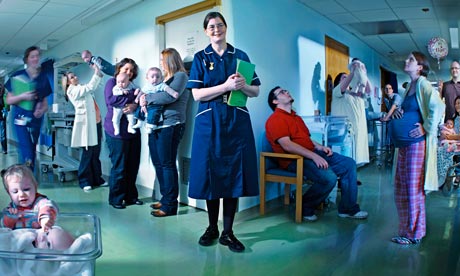
One Born Every Minute begins with a long howl, which usually sets the tone for the rest of the episode. There is blood, bodily fluids, and a lot of screaming – so how to explain its popularity? Filmed on the maternity ward of Southampton's Princess Anne hospital, the show (its second series ends next week) has regularly drawn more than 3 million viewers, attracts masses of comments on its Facebook page, and last year won a Bafta for best factual series.
After the artifice of most reality television, it feels thrillingly natural: there is no voiceover, and the sensationally precarious births are balanced by the tedium of mothers waiting for their waters to break. For the stars – the parents and the staff – the aim is always to deliver each baby safely, not to be on television.
There are women who have gone through years of IVF, multiple miscarriages and stillbirth, and dazed, pregnant teenagers, barely out of childhood themselves. But it's not just a programme for breeders or the broody; I am more inclined to swoon over puppies than babies, yet every week, something in it – usually the sight of a tiny, slimy human becoming aware it has just entered the world– will bring sudden tears.
Sue Macdonald, education manager of the Royal College of Midwives, says she has noticed more enquiries from people wanting to train in midwifery. "You get a picture of what births are like," she says. "There have been some nice experiences and others where there has been more intervention. For the majority of women, birth is very normal and the programme makers need to continue to make sure they show that." It's also useful for helping pregnant women. A practising midwife I talked to says she has seen many expectant mothers who watch the programme. "It does help women think about what it's going to be like and help them plan what they want for their birth so I think it is useful," she tells me.
I've always imagined the programme would be terrifying if you were pregnant, but Alison Crickmore, who had her first baby last week, was such a fan she forced her husband to watch it, though she didn't necessarily find it that helpful. "The screaming did worry me, and it makes it appear that all women go through that. During the birth I never felt the urge to scream and shout – I was in and out of the maternity ward for four days in labour and only heard two women screaming. And often it was hard to get an insight into how long the women's stages of labour were. I enjoy the programme but it didn't really prepare me for childbirth."
The focus, unsurprisingly, is on the women, "but for me, each of the best episodes have been about the moment a man has to grow up", says Simon Dickson, the Channel 4 executive who commissioned the series. A few of the men are hilariously witless – like the one who blows up a rubber glove and uses it to tap his partner annoyingly, or fail to make it into the operating theatre because they're worried about the sight of blood – but others are so lovingly careful with their pregnant partner and growing family that it does more to show what is expected of men in the 21st century than any other programme.
Every week I wonder how they manage to get women to agree to be filmed at their most vulnerable, often nearly naked and usually in extreme pain. Caroline Pike, 30, from Bridport, and her husband Chris, who feature in the final episode next week, had conceived triplets through IVF. "We were apprehensive, because it is a very private thing," she says. "But we thought it would be a good memento for the babies. We also wanted to promote neonatal care."
Caroline had to have an emergency caesarean at short notice. Her husband was at work 75 miles away, "so it was brilliant for him that it was filmed," she says. "Everyone on the programme was so supportive, so it never felt intrusive. It's emotional for both of us looking back and seeing those intimate moments. At the time you're so wrapped up in it that it's nice to be able to replay it later." The only thing they asked not to be filmed was when the news was broken that one of their sons, William, would have to have bowel operations.
Will it not feel unsettling to share such an intense and private experience with millions? "Yes and no. Because we had tried for a long time to get pregnant, I think it was important to show people that through all the heartache good things can happen," says Caroline.
Julia Rayner, 31, from Southampton had similar reasons for taking part. She was born with a heart defect and told she should never have children. "I wanted to make other people in my position aware of what they could do." All mothers are shown the edited programme before it goes out. "There was nothing I could fault," says Julia. Was there anything she asked not to be filmed. She laughs and says "Anything from the waist down."

